RELATING WITH FOOD
April is Californians “Eat Right & Exercise” to Prevent Cancer month. I am always amazed at how many people still are unaware of the critical role that nutrition plays in keeping us healthy & lowering our risk for diseases, like cancer & heart disease. Both of these diseases have been found to have a strong link with nutrition. One third of all cancers are nutrition related. Heart disease is the number one killer in the United States & has a very strong link with nutrition. One out of 2 women will die of heart disease! Nearly half of all residents of Ventura County are likely to die from heart disease or stroke! So look around you, which one of the 2 groups do you want to be in – the nearly one half that will die, or the little over half that will live?
Wellness & preventative nutrition is not a new topic! Most people at least have some concept of the general guidelines:
•Eat more fruit, vegetables & whole grains (plant sources)
•Limit total fat intake to less than 30% of total calories & less from animal sources (saturated fats)
•Be physically active to achieve & maintain a healthy weight
•Limit sodium intake to no more than 2,400 milligrams (mg.) per day (1 tsp. of table salt is 2,300 mg. of sodium)
Now the question is, how do Americans get these guidelines into practice & make the necessary changes?
One of the most important things to keep in mind is that focusing on the negative does not change it to positive. If the focus is on the negatives of the past & present, then more negatives are often accomplished. However, if the focus is on the positives, no matter how small they may seem, then it is more likely to accomplish positive changes.
It is also important to keep the long-term goals in mind. After all, it is not short quick fixes that make the difference in risk factors; it is the life-long ways that change our risk. For example, eating high fat foods for one day or one meal does not significantly increase the risk factors. However, eating high fat foods regularly certainly does!
First, take a good look at where your current relationship with food is. Is it healthy? Is it having a negative impact on your life? Now, or in the future? What type of relationship with food could you maintain for the rest of your life? Be careful not to be overly restrictive. People often rebound binge on the foods they have restricted too much. Balance, moderation, and variety are the keys to having a long-term healthy eating pattern.
Next, decide what part of the long –term goals you want to focus on first. Choose just 2 or 3 things in your relationship with food that you want to start changing. Then think about ways to make it easier for you to change the habits. For example, if you are not a ‘natural fruit eater,’ and decide to focus on eating more fruit, then buy a couple of pieces of different kinds of fruit at the grocery store. Next, plan to take 2 pieces of fruit out of the refrigerator each morning. Take one (or both) with you to work & leave the other one visible on the counter so you will see it. Now plan your day’s eating to include the fruit.
Now, keep working on this focus point (i.e. increasing fruit in your daily eating) until it becomes easier & more second nature. This means, when you no longer have to remind yourself daily to eat your fruit, then you are developing those ‘natural fruit eater’ habits. Now you can choose another focus point to concentrate on, but don’t forget the first one. Check in with yourself on a daily basis to see how each focus point is coming along. This can be done very simply while you’re getting ready in the morning or driving to work or even while getting ready for bed at night.
Patience is of utmost importance! People are often resistant to change. Let’s keep in mind, how many years has the relationship with food been the other way? It takes some time to change behaviors and habits for the long term. Focus on every little improvement & give yourself credit for those changes! Of course, do not reward yourself with food!!! Use healthier rewards, such as one of your favorite activities (like reading, taking a long bath, walking on the beach, etc.) or visiting one of your favorite places.
Life long changes in a relationship with food take time, effort and relearning habits and beliefs about food. The goal is progress, not perfection!
Now, let’s get started on the journey to a healthier relationship with food!
HEALTHY EATING!
*** Reproduction of this newsletter in an unaltered state is permitted for educational purposes only. Reproduction for sales purposes is not authorized. ***
